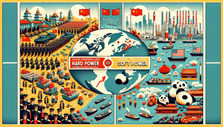The Global Commons & the Reconstruction of Sino-U.S. Military Relations
Li Yan
The “global commons,” which refers mainly to the sea, the skies, outer
space and cyberspace, has become more and more congested and contested
in recent years. Stable and dependable access to the global commons is
vital to the international economy and to international security. The global
commons should be kept secure and open. However, as the major powers
invest in upgrades of their armed forces and accelerate the development of
new weapons systems for the purpose of competing for predominance, the
global commons has become contested. Non-state actors such as pirates and
“hacktivists” also threaten the security and openness of the global commons.This paper discusses the Global Commons from a Chinese perspective.
Related Publications
-
The US and EU, and the Emerging Supply Chain Network: Politics, Prospects, and Allies
The Global Supply Chains have evolved from simply logistical achievements to being the bedrock of the global economy. Driven by technological advances and geopolitical shifts, this transformation underscores the critical […]
-
China as a Black Sea Actor: An Alternate Route
China’s international role has expanded rapidly in the last decades, and the Greater Central Asian region, Europe, and the Middle East, to which the Black Sea region (BSR) connects, are […]
-
Hegemony at a Crossroads: The Inverse Dynamics of China’s Global Strategy
Here is my bold statement. Hard power projection decimates soft power but only for authoritarian states. In the early 21st century, I was living in Beijing and at that time […]
-
EU-Thailand FTA Negotiations: IUU Fishing and Human Rights Remain Obstacles
Thailand’s fishing industry, which at its height saw as many as 200,000 migrant workers from neighboring Laos, Myanmar, and Cambodia caught in a brutal system of abuse, withered global criticism […]
-
ISDP Annual Report 2023
ISDP’s Annual Report for the year 2023. We look back on 2023, a year in which tensions and conflicts captured the strategic space in ISDP’s focus areas, making headlines around […]




